

#GrowthMindset What You Need to Know. How People Learn to Become Resilient. Norman Garmezy, a developmental psychologist and clinician at the University of Minnesota, met thousands of children in his four decades of research.
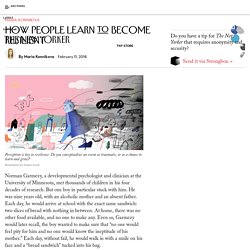
But one boy in particular stuck with him. He was nine years old, with an alcoholic mother and an absent father. Each day, he would arrive at school with the exact same sandwich: two slices of bread with nothing in between. At home, there was no other food available, and no one to make any. Problem with 'Grit,' KIPP, and Character-Based Education. There are three major problems with the new character education.
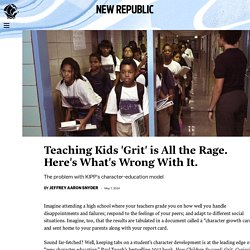
The first is that we do not know how to teach character. The second is that character-based education is untethered from any conception of morality. And lastly, this mode of education drastically constricts the overall purpose of education. There may be an increasingly cogent “science of character,” as Levin says in the introductory video to his online class, but there is no science of teaching character. Growth Mindset: The Latest Fad? - Release Your Inner Drive.
Every so often a new phrase enters the education and sporting world and quickly becomes the thing that everyone is talking about. 2014-15 looks set to be the year of the Growth Mindset.

Despite being prominent in research circles for over a decade, it is only now becoming a recognised term in everyday settings. So, what is it? How strong is the science behind it? Growth mindset: What interventions might work and what probably won’t? Whether discussed under the guise of ‘resilience’, ‘grit’ or ‘character’, there appears to be a great appetite for psychologically manipulating pupils’ personalities or their attributions about school.

One concept which has particularly captured the imagination of teachers and school leaders is ‘growth mindset’: the idea that children who possess incremental theories of intellect (a growth mindset) appear to achieve better grades than those who possess an entity theory of intellect (a fixed mindset). The claim that there are attributional differences between pupils which can affect their experience of school and their academic outcomes is well supported. You can read a bit more about some of the psychology behind the idea of a ‘growth mindset’ here: Growth Mindset: It’s not magic • Firstly, will changing a pupil’s attributions (their attitudes and beliefs) cause desirable changes in behaviour? Can we change behaviour through changing attitudes?
Five Reasons to Stop Saying "Good Job!" (**) September 2001 By Alfie Kohn NOTE: An abridged version of this article was published in Parents magazine in May 2000 with the title “Hooked on Praise.”

For a more detailed look at the issues discussed here — as well as a comprehensive list of citations to relevant research — please see the books Punished by Rewards and Unconditional Parenting. Grit: A Skeptical Look at the Latest Educational Fad (##) Fall 2014 A Skeptical Look at the Latest Educational Fad By Alfie Kohn This article is adapted from The Myth of the Spoiled Child, which contains references to the relevant research.

A new idea is hatched; it begins to spread; it catches on; it inspires a flurry of books and articles, conferences and seminars. And then it fades away. The education fad that’s hurting our kids: What you need to know about “Growth Mindset” theory — and the harmful lessons it imparts. One of the most popular ideas in education these days can be summarized in a single sentence (a fact that may help to account for its popularity).
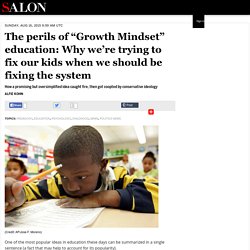
Here’s the sentence: Kids tend to fare better when they regard intelligence and other abilities not as fixed traits that they either have or lack, but as attributes that can be improved through effort. In a series of monographs over many years and in a book published in 2000, psychologist Carol Dweck used the label “incremental theory” to describe the self-fulfilling belief that one can become smarter. Rebranding it more catchily as the “growth mindset” allowed her to recycle the idea a few years later in a best-selling book for general readers. By now, the growth mindset has approached the status of a cultural meme.
BBC Radio 4 - Mind Changers, Carol Dweck and Growth Mindset. Growth Mindset Misconceptions and Missteps. I have been working on developing a growth mindset culture in my school since October 2013, when I heard John Tomsett speak at TLT13.
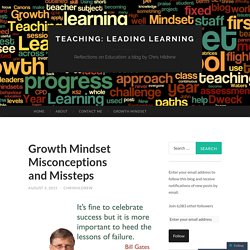
Over that time I have learned a lot about what works, what doesn’t work, and the stumbling blocks and misconceptions that still persist around growth mindset. I have also learned a lot more about the growth mindset, and refined my thinking about Dweck’s work. In this post I hope to summarise some of that learning. Misconception 1: I’ve got a growth mindset, so everything’s okay. The scourge of motivational posters and the problem with pop psychology in the classroom. Fifteen years ago I watched David Brent give this masterclass in motivation.
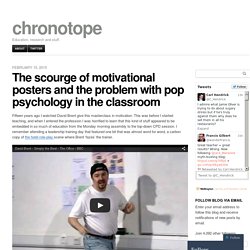
This was before I started teaching, and when I entered the profession I was horrified to learn that this kind of stuff appeared to be embedded in so much of education from the Monday morning assembly to the top-down CPD session. I remember attending a leadership training day that featured one bit that was almost word for word, a carbon copy of the hotel role-play scene where Brent ‘fazes’ the trainer. Nowhere is this pseudo-profundity more alive today than in social media, and the weapon of choice for this kind of stuff is the motivational poster. The Problem with Growth Mindset. I was brought up by my family to believe that you got your just rewards for working hard.
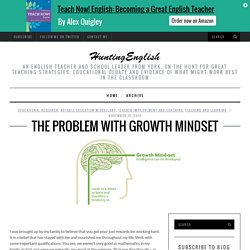
It is a belief that has stayed with me and nourished me throughout my life. Well, with some important qualifications. You see, we weren’t very good at mathematics in my family. Growth Mindset - More Evidence. If you are a school teacher and you haven’t heard of Carol Dweck’s ubiquitous growth and fixed mindset concept then… quite frankly, where the hell have you been for the past few years? No doubt lots of good has emerged from this common-sense psychological framework, with a few dodgy approaches too. The growing evidence base, showing the limitations, flaws and best bets relating to these popular psychological interventions, is important to help improve what we do in schools. More recent evidence related to growth mindset interventions is emerging – developing our knowledge and adapting our practice. Only this week, the Education Endowment Foundation published its Changing Mindsets EEF report, based on the trial conducted by the University of Portsmouth.
How to make growth-mindset theory work in the classroom. “When I read the book Mindset by Carol Dweck, I kept turning the page hoping that she might start to tell me how to ‘do it’ in the classroom,” says Katie Walton, a teacher from Cambridgeshire. “But it didn’t happen.” It’s a common experience. Putting Growth Mindset into Practice. - Growth Mindset Maths. 4 Ways to Encourage a Growth Mindset in the Classroom. EdSurge Newsletters Receive weekly emails on edtech products, companies, and events that matter. Contrary to popular belief, high achievement isn’t merely a product of talent and ability. In fact, our internal beliefs about our own abilities, skills, and potential actually fuel behavioral patterns and predict success. Leading Stanford psychologist Carol Dweck argues that the pivotal quality separating successful people from their unsuccessful counterparts is whether they think their intelligence can be developed versus believing it is fixed.
“There is no relation between students' abilities or intelligence and the development of mastery-oriented qualities. New Research: Students Benefit from Learning That Intelligence Is Not Fixed. Arten Popov Teaching students that intelligence can grow and blossom with effort – rather than being a fixed trait they’re just born with – is gaining traction in progressive education circles. And new research from Stanford is helping to build the case that nurturing a “growth mindset” can help many kids understand their true potential. The new research involves larger, more rigorous field trials that provide some of the first evidence that the social psychology strategy can be effective when implemented in schools on a wide scale.
Even a one-time, 30-minute online intervention can spur academic gains for many students, particularly those with poor grades. Why the Growth Mindset is the Only Way to Learn. “You’re too old to learn a foreign language.” “I couldn’t work on computers. I’m just not good with them.” “I’m not smart enough to run my own business.” Do you know what these statements have in common? They’re all examples of the fixed mindset- the belief that intelligence, ability, and success are static qualities that can’t be changed. Mindset Works®: Student Motivation through a Growth Mindset, by Carol Dweck, Ph.D. Growth Mindset Development. Downside of Grit. Ten concerns about the ‘let’s teach them grit’ fad - The Washington Post. The Problem with Growth Mindset. Grit and growth: who’s to blame for low achievement?